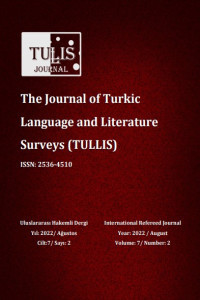ETNOGRAFİK BAĞLAMDA OBJEKTİFLİK, DOĞRULUK VE “DİĞER” KAVRAMININ BAĞLAMSAL ANALİZİ
Çalışmamızda ele alınan ve tartışılan Johannes Fabian ve Rigoberta Mençu'nun doktrini bağlam içinde çok değişkenlik içermektedir. Bu öğretilerden ve içerdikleri kavramsal terminolojiden bahsedilecek olunursa; Menchú'nun çalışmalarının analizi biraz daha karmaşık ve belirsiz görünmektedir. Bu belirsizlikler eserin farklı yönlerinde yatmaktadır: Burada, öteki hakkında bilgi üreten özne ile bilginin kendisi hakkında üretilmesini bekleyen pasif nesne arasındaki ikili karşıtlıktan daha karmaşık bir bilen-bilinen ilişkisi vardır. Bununla bağlantılı olarak, beşerî bilimler içinde, özellikle antropolojide baskın türlerden farklı bir türün kullanılması ve güvenilirliği mevcut bilim paradigmalarına göre sorgulanabilir. Dahası, Menchú'nun yapıtının üretimi, yeniden üretimi, temsili ve alımlaması hakkında bu tür çelişkili görüşlerin ortaya çıkması –kendi toplumu için ve onun hakkında farklı bir bilgi üretme ve temsil etme çabası– toplumsal, siyasal ve ekonomik bağlamdan bağımsız olarak diğer topluluklar hakkında mutlak bir bilgi/soyut hakikat üretme olasılığının sorgulanmasını beraberinde getirmektedir. Bu da dikkatimizi yine güç-bilgi ilişkisine, bilginin kısmiliğine ve yerleşik bilgiye çekmektedir. Bu nedenle, daha iyi bir anlayış üretmeye istekli çağdaş etnografyanın epistemolojisini incelemek için diğerleriyle bir ilişki kurmak, araştırmacı ve araştırmacıları farklı yerlerde bulan daha geniş toplumsal ilişkilerin içine / boyunca gömülü olan bu epistemolojiyi araştırmayı gerektirmektedir. Bu girişim, etnografyanın modern antropolojiden miras aldığı pozitivist bilimsellikle, yani Batı modernite projesinin baskın varsayımlarıyla uğraşmayı zorunlu kılmaktadır. Çalışmamızda bu kavramlar sorgulanmış, yorumlanmış ve tartışılmıştır.
Anahtar Kelimeler:
etnografik bağlam, antropoloji, analiz, "diğer" kavramı, epistomoloji
CONTEXT ANALYSIS OF THE CONCEPT OF OBJECTIVITY, ACCURACY AND “OTHER” IN ETNOGRAPHIC CONTEXT
The doctrine of Johannes Fabian and Rigoberta Mençu, which is discussed and discussed in our study, includes a lot of variability in context. If these doctrines and the conceptual terminology, they contain are mentioned; the analysis of Menchú’s work has seems a bit more complex and ambiguous. These ambiguities lie in different aspects of the work: Here, there is a more complex knower-known relationship than the binary opposition between the subject which produces knowledge about the other and the passive object which expects the knowledge to be produced about itself. In relation to this, to employ a genre different from the dominant genres within humanities, particularly in anthropology, and its reliability are questionable according to the current science paradigms. Moreover, the emerging of such contradictory views about the production, reproduction, representation, and reception of Menchú's work -the attempt of producing and representing a different knowledge for and about her own community- brings about questioning of possibility of producing an absolute knowledge/abstract truth about the other communities independent from social, political and economic context. This again draws our attention to the power-knowledge relation, the partiality of knowledge and situated knowledge. Thus, establishing a relation with the other needs to study epistemology of contemporary ethnography willing to produce better understanding, and requires investigating this epistemology embedded within/along broader social relations that locate researcher and researched in different places. This attempt entails to deal with the positivist scientifism inherited by ethnography from modern anthropology that is to say with the dominant assumptions of western modernity project. In our study, these concepts were questioned, interpreted, and discussed.
Keywords:
etnograpic context, anthrophology, analysis, "other" concept, epistemology,
___
- ARİAS, A. (2001). Rigoberta Menchú’s History within the Guatemalan Context. In Rigoberta Menchú Controversy. (ed. Arias, A.) Minneapolis: University of Minnesota Press.
- ARİAS, A. (2001). Authoring Ethnicized Subjects: Rigoberta Menchú and the Performative Production of the Subaltern Self. PMLA, Vol. 116, No. 1: 75-88.
- BURGOS, I- DEBRAY, E. (1984). Rigoberta Menchú: An Indian Woman in Guatemala. London: Verso Publishing.
- FABİAN, J. (2001). Ethnographic Objectivity: From Rigor to Vigor. In Anthropology with an Attitude: Critical Essays. Stanford: Stanford University Press.
- FEUCHWANG, S. (1973). Man, Royal Anthropological Institute of Great Britain and Ireland, Vol. 8, No. 1.
- FOUCAULT, M. (1970). The Order of Things. London: Tavistock Publishing.
- FOUCAULT, M. (1972). The Archaeology of Knowledge. London: Tavistock Publishing.
- FOUCAULT, M. (1991). Discipline and Punish. London: Penguin Publishing.
- HALL, S. (1995). New Cultures for Old. In A Place in the World: Places, Cultures and Globalization. (ed. Allen, and J. Massey. D.). Oxford: Oxford University Press.
- HARAWAY, D. J. (1991). Situated Knowledges: The Science Question in Feminism and the Privilege of Partial Perspective. In Simians, Cyborgs, and Women: The Reinvention of Nature. New York: Routledge Press.
- JAY, N. (1981). Gender and Dichotomy. Vol. 7, No. 1, pp. 38-56.
- JORDAN, S and YEOMANS, D. (1995). Critical Ethnography: Problems in Contemporary Theory and Practice. British Journal of Sociology of Education. Vol. 16. No. 3: pp. 389-408.
- KUHN, S. T. (1962). The Structure of Scientific Revolutions, Chicago: University of Chicago Press.
- MASSEY, D. (1994). Space, Place, and Gender. Cambridge: Polity Press.
- ÖZLEM, D. (1994). Metinlerle Hermeneutik (Yorumbilgisi) Dersleri. Cilt I-II. İstanbul: İnkilap Yayınevi.
- ÖZLEM, D. (1999). Siyaset, Bilim ve Tarih Bilinci. İstanbul: İnkilap Yayınevi.
- ÖZLEM, D. (2000). Kültür Bilimleri ve Kültür Felsefesi. İstanbul: İnkilap Yayınevi.
- ÖZLEM, D. (2003). Bilim Felsefesi. İstanbul: İnkilap Yayınevi.
- POPER, Carl. (1967). The Revolution in Anthropology. Routledge Publishing.
- PRATT, M. L. (2001). Rigoberta Menchú and the Culture Wars. In Rigoberta Menchú Controversy, (ed. Arias), A. Minneapolis: University of Minnesota Press.
- ROSALDO, R. (1993). Culture and Truth: the Remaking of Social Analysis. Boston: Beacon Press.
- SAİD, E. (1985). Orientalism. London: Penguin Press.
- Başlangıç: 2016
- Yayıncı: Kamil Ali GIYNAŞ
